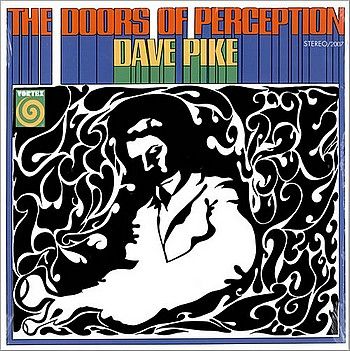
Dave Pike - The Doors Of Perception - 1970 - Vortex
Although the music could be classified as "free jazz" or avant garde jazz, which sometimes deters people from listening to this kind of music, it's a great album full of experimental modal jazzed-out pieces with some heavy psychedelic soul jazz grooves from Dave Pikes vibraphone and marimba, and with just enough echo to make it "trippy". There's also fuzz bass and some rainstorm sound effects. Very accessible, listenable, and enjoyable. It is worthwhile listening to Dave Pike's "Pike's Groove" album
TRACKS
A1 Free Improvisation 3:06
A2 The Drifter 7:09
A3 The Doors Of Perception 3:29
B1 Ballad 5:30
B2 Anticipation 8:05
All music composed by Dave Pike
MUSICIANS
Electric Bass - Chuck Israel
Piano - Don Friedman
Drums - Arnie Wise
Alto Saxophone - Lee Konitz
Tenor Saxophone, Clarinet - Eddie Daniels
Marimba, Vibraphone - Dave Pike
REVIEWS
Friedman's hip piano work. "Ballad," on the other hand, is relatively straight, sweet, soft, and tender, but again features those spacy vibes. The whole joint gets taken out the door with "Anticipation," a hard bop number with great alto work from Konitz (albeit sounding a little warped by shifting primitive stereo effects) and Daniels that alternates between the latter's down-and-dirty blowing and the former's elegant phrasing. The rhythm section just dazzles, with Friedman doing some of his best work in both comping and soloing here. He's deep into the groove laid down by Wise and Israel — the latter of whom walks that line and gets good wood on his upright. When Pike enters with his bright vibes, the whole thing moves off into jazz via the Jetsons! While The Doors of Perception may not be every Pike fan's cup of what have you, it will certainly appeal to those who dug his sides for the German MPS label in the early '70s. The bottom line: there is so little of his work available on CD in America anyway that this one — particularly as a budget release — is well worth plunking down the cash for. © Thom Jurek © 2010 Rovi Corporation. All Rights Reserved http://www.allmusic.com/cg/amg.dll?p=amg&sql=10:dxfyxqrgldse
Groovily tripped-out work from vibist Dave Pike – and one of the few American albums that matches the experimental sound of his work for MPS! The session's often quite free and open – in a way that not only uses odd instrumental combinations and arrangements, but which also features some offbeat production by Herbie Mann that further abstracts the sound! Elements of Pike's earlier work shine through in a few of the more straightforward groovers, but his new European-endowed sense of hipness wins in the end – thanks to a good deal of modal grooves, psychedelic elements, and even a bit of fuzzy Fender bass! Other players include Lee Konitz on alto sax, Don Friedman on piano, Chuck Israel on bass (electric and acoustic), and Eddie Daniels on tenor and clarinet – and titles include "Free Improvisation", "The Drifter", "Ballad", "The Doors Of Perception", and "Anticipation". © 1996-2010, Dusty Groove America, Inc. http://www.dustygroove.com/item.php?id=2y6wfmww4v
BIO (WIKIPEDIA)
David Samuel Pike (born March 23, 1938 in Detroit) is a jazz vibraphone player. He learned drums at the age of eight and is self-taught on vibes. He has also played marimba, particularly with Herbie Mann. Lionel Hampton, Milt Jackson, and Cal Tjader were early inspirations for him. He began putting an amplifier on his vibes when working with flautist Herbie Mann in the early 1960s. There are several other works he did inspired by Brazilian jazz, Latin jazz, or world music. By the late 1960s, Pike's music became more exploratory, contributing a unique voice and new contexts that pushed the envelope in times remembered for their exploratory nature. "Doors of Perception," released in 1970 for the Atlantic Records subsidiary Vortex Records and produced by former boss Herbie Mann, explored ballads, modal territory, musique concrete, with free and lyrical improvisation, and included musicians like alto saxophonist Lee Konitz, bassist Chuck Israels (of Bill Evans and Ornette Coleman fame) and the vastly underrated pianist Don Friedman whose artistry was up to the task of finding new spaces in the jazz idiom. Pike's move to Europe and tenure at MPS/Saba records produced some of the most original jazz of the period. With the collaboration of Volker Kriegel (guitar), J. A. Rettenbacher (acoustic and electric bass), and Peter Baumeister (drums), he formed the Dave Pike Set. The group recorded 6 brilliant records from 1969-1972 that spanned the gamut from funky grooves to free, textural territory. The group, though short-lived, created a unique identity and textural palette. Kriegel's compositional and instrumental (playing acoustic, classical, and electric guitar as well as sitar) contributions to the group helped set the Dave Pike Set's sound apart, organically incorporating influences from jazz, soul jazz, psychedelia, avant garde music, and world (Indian, Brazilian, Latin and Middle Eastern sounds) music.





1 comment:
LINK
p/w aoofc
Post a Comment